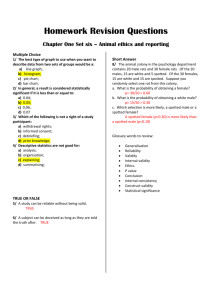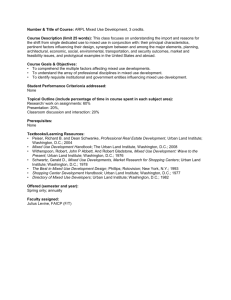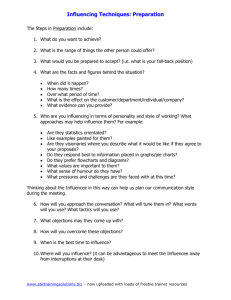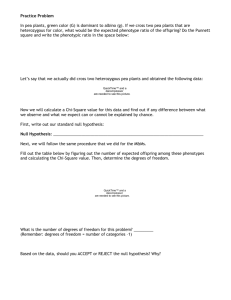'Barriers' and 'Influences'
advertisement
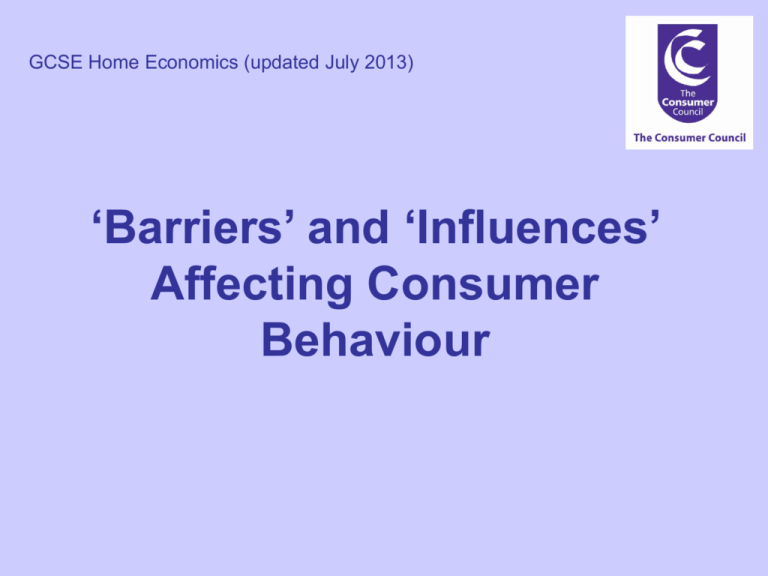
GCSE Home Economics (updated July 2013) ‘Barriers’ and ‘Influences’ Affecting Consumer Behaviour Barriers The following factors can act as barriers... • disability • age • ethnicity • knowledge • resources (time, money, location) Disability • Physical barriers • Perceived barriers • Hidden disabilities • Socially isolated BBC Learning Zone Clip: “disabled people have a fear of complaining which is related to their low levels of confidence” Quote from Consumer Proficiency research1 http://www.bbc.co.uk/learningzone/clips/6034.bb.wmv N.B. Left click in slide show to activate internet link to clip (also referenced in Effective Consumer materials list) 1.Consumer Knowledge well, what do you know? March 2004 Age – Older Consumers Those who can’t jump into a car are losing out and are at the mercy of family and friends, home help or deliveries. Those ‘buy one get one free’ are no good for me because by the time I use one, the other is out of date. Cooking information is usually small and virtually unreadable, very difficult to compare like with like. Quotes from: Silver Service? Are supermarkets meeting the needs of older consumers? Consumer Council in partnership with Age Concern, November 2007 – >>>Play Silver Service DVD (copies available on request from the Consumer Council) Age – Older Consumers • Levels of online shopping are lowest amongst older people aged 65+ • Only 10 per cent of over 65’s shopped online at least once a month and 82 per cent never shopped online Source: Canny Consumers? Are consumers standing up for their rights? Consumer Council, August 2012 www.consumercouncil.org.uk/publications Age –Younger Consumers • Young consumers aged 16-24 considered themselves to be not well informed about their consumer rights • However, 69 per cent of 16-24 year olds say they feel confident in speaking up if something goes wrong with goods or services they’ve bought. Source: Canny Consumers? Are consumers standing up for their rights. Consumer Council, August 2012 Ethnicity • Language barriers • Prejudice • Cultural differences • Social isolation Knowledge In general, consumer skills remain less well developed among: • young people (15-24) • older people (55+) • those living on a low income Source: Canny Consumers? Are consumers standing up for their rights. Consumer Council, August 2012 Other barriers 1 in 4 people of working age in Northern Ireland have low literacy levels. Discuss the problems this could cause a consumer Resources Time Working hours Money Low income Location Rural Dependents Access to credit Food deserts Lack of time Financial to do capability ‘research’ Transport Quote from Consumer Council Disability Panel member N.B This list is not exhaustive! Shopping around is a luxury that some can’t afford 7 Consumer Tests* Access: can people get the goods or services they need or want? Choice: is there any? Safety: are the goods or services dangerous to health or welfare? Information: is it available, accurate, accessible and useful? Fairness: are some consumers unfairly discriminated against? Redress: if things go wrong, is there a system for putting them right? Representation: do consumers have a say in how goods or services are provided? * The 7 consumer tests were developed in the 1970s and are still used today to measure the delivery of goods and services in private and public sectors Influences on Consumer Behaviour i.e. What makes us shop where and for what? Impact of Marketing “Advertising is the art of convincing people to spend money they don’t have for something they don’t need.” Will Rogers “ I have always believed that writing advertisements is the second most profitable form of writing. The first of course is ransom notes…” Philip Dusenberry In 1937, Disney licensed Snow White’s image before the film release, creating demand for Snow White goods…today, we still see children’s filmed linked with marketing for toys, clothing, burger meal deals etc Targeting Young Consumers “advertising at its best is making people feel that without their product, you’re a loser. Kids are very sensitive to that. If you tell them to buy something, they are resistant. But, if you tell them that they’ll be a dork if they don’t, you’ve got their attention. You open up emotional vulnerabilities…” Nancy Shalek, Shalek Agency, cited in Juliet. B. Schor’s Born to Buy: the commercialised child and the new consumer culture, Scribner, 2004 Targeting Young Consumers The average 10 year old had internalised 300 – 400 brands – 20 times the number of wild birds they could name! Nickeodean study 2001 Social Psychology of Food “Parents struggle hard to protect their children from bullying – and make sure that their children’s lunchboxes are as full as their classmates. In this way, snacks like crisps or chocolate are not seen as luxuries but a way for their children to participate in conventional behaviour…” Middleton, S., Ashworth, K. and Walker, R., Family Fortunes: pressures on parents and children in the 1990s, Child Poverty Action Group, 1994 Influencing Factors Cultural Economic Environmental and ethical Personal Physiological Psychological and Social Influencing Factors Cultural Someone of Chinese origin might shop for specific ingredients at an Asian supermarket Can you think of other examples? Influencing Factors Economic A person living on a tight budget would be unlikely to buy luxury items as part of their weekly food shop. Can you think of other examples? Influencing Factors Environmental and ethical A shopper opposed to animal cruelty may choose not to buy products that have been tested on animals. Can you think of other examples? Influencing Factors Personal A teenager might feel more comfortable downloading music online, whereas an older consumer might prefer to purchase a CD. Can you think of other examples? Influencing Factors Physiological Someone who is trying to lose weight may wish to avoid fast food and high sugar snacks. Can you think of other examples? Influencing Factors Psychological Some shops play music designed to make consumers feel good, stay longer and buy more. Can you think of other examples? Influencing Factors Social Some consumers are influenced by trends and want the latest ‘must-have’ toys, fashion items or technology. Can you think of other examples? You Were Spotted! Activity Cultural Economic Environmental and ethical Personal Physiological Psychological and Social Taken from the ‘What influences consumer behaviour’ lesson plan, match the character(s) to the activity and say what the influencing factors is You Were Spotted! Activity 1. Spotted…shopping for chilies, sausages and sweet potatoes at Saturday’s Farmers’ Market. 2. Spotted…buying fresh haddock reduced to £1 because it’s nearing its use-by date. 3. Spotted…disposing of used plastic carrier bags at the supermarket collection bin. 5. Spotted…loading a trolley with half price bedding plants and compost. 4. Spotted…coming back from the sales, trying to juggle several shopping bags whilst chatting on the mobile. 6. Spotted…at the till, filling a rucksack with shopping essentials. 8. Spotted…at the electrical counter in Tesco discussing the merits of a camera phone with the salesperson. 10. Spotted…at the cinema with a home-made picnic of sandwiches, crisps and fruit juices. 7. Spotted…queuing at a late night Spar to buy milk. 9. Spotted…taking delivery of shopping which was ordered online. Recap on resources Lesson Plans Being a consumer What influences consumer behaviour What type of yoghurt are you? Multimedia BBC Learning Zone Clip – re: disability Silver Service DVD – re: older consumers Buy Rights – Have Your Say – re: young consumers
